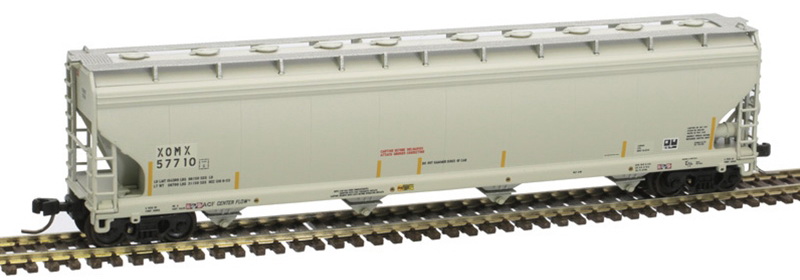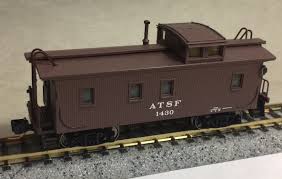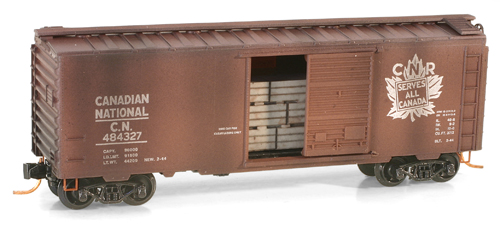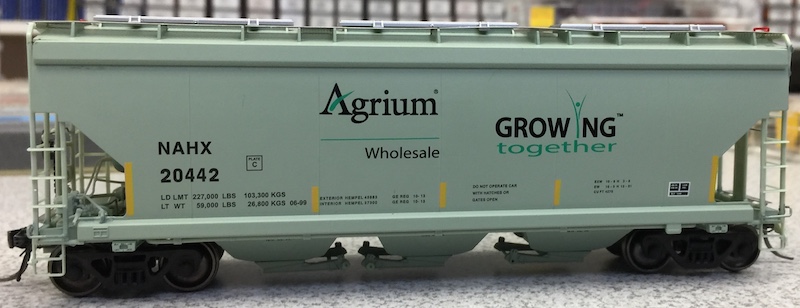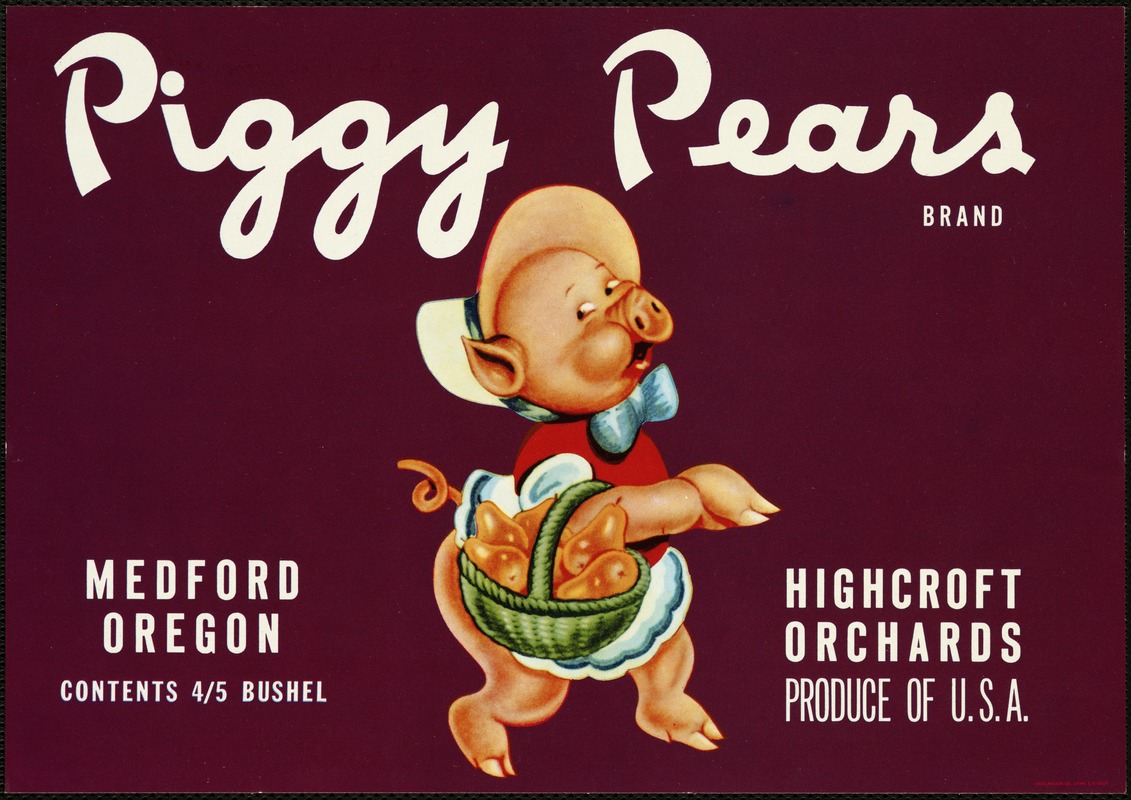Specific Item Information:
- Eight or nine full-width panel body as appropriate
- Etched metal roof walks
- Ten 20” hatches or two continuous hatch designs as appropriate
- Pneumatic or gravity outlets as appropriate
- Blackened metal wheels
- Accurate painting and printing
- 100-ton roller-bearing trucks and body mounted AccuMate® couplers with screw-attached coupler pockets.
Road Name History:  Exxon Mobil Corporation, doing business as ExxonMobil, is an American multinational oil and gas corporation headquartered in Irving, Texas. It is the largest direct descendant of John D. Rockefeller's Standard Oil Company, and was formed on November 30, 1999 by the merger of Exxon (formerly the Standard Oil Company of New Jersey) and Mobil (formerly the Standard Oil Company of New York).
Exxon Mobil Corporation, doing business as ExxonMobil, is an American multinational oil and gas corporation headquartered in Irving, Texas. It is the largest direct descendant of John D. Rockefeller's Standard Oil Company, and was formed on November 30, 1999 by the merger of Exxon (formerly the Standard Oil Company of New Jersey) and Mobil (formerly the Standard Oil Company of New York).
The world's 10th largest company by revenue, ExxonMobil from 1996 to 2017 varied from the first to sixth largest publicly traded company by market capitalization. The company was ranked ninth globally in the Forbes Global 2000 list in 2016. ExxonMobil was the second most profitable company in the Fortune 500 in 2014.
ExxonMobil is the largest of the world's Big Oil companies, or supermajors, with daily production of 3.921 million BOE (barrels of oil equivalent); but significantly smaller than a number of national companies. In 2008, this was approximately 3 percent of world production, which is less than several of the largest state-owned petroleum companies. When ranked by oil and gas reserves, it is 14th in the world—with less than 1 percent of the total. ExxonMobil's reserves were 20 billion BOE at the end of 2016 and the 2007 rates of production were expected to last more than 14 years. With 37 oil refineries in 21 countries constituting a combined daily refining capacity of 6.3 million barrels (1,000,000 m3), ExxonMobil is the largest refiner in the world, a title that was also associated with Standard Oil since its incorporation in 1870.
ExxonMobil has been criticized for its slow response to cleanup efforts after the 1989 Exxon Valdez oil spill in Alaska, widely considered to be one of the world's worst oil spills in terms of damage to the environment. ExxonMobil has a history of lobbying for climate change denial and against the scientific consensus that global warming is caused by the burning of fossil fuels. The company has also been the target of accusations of improperly dealing with human rights issues, influence on American foreign policy, and its impact on the future of nations.
From Wikipedia

The world's 10th largest company by revenue, ExxonMobil from 1996 to 2017 varied from the first to sixth largest publicly traded company by market capitalization. The company was ranked ninth globally in the Forbes Global 2000 list in 2016. ExxonMobil was the second most profitable company in the Fortune 500 in 2014.
ExxonMobil is the largest of the world's Big Oil companies, or supermajors, with daily production of 3.921 million BOE (barrels of oil equivalent); but significantly smaller than a number of national companies. In 2008, this was approximately 3 percent of world production, which is less than several of the largest state-owned petroleum companies. When ranked by oil and gas reserves, it is 14th in the world—with less than 1 percent of the total. ExxonMobil's reserves were 20 billion BOE at the end of 2016 and the 2007 rates of production were expected to last more than 14 years. With 37 oil refineries in 21 countries constituting a combined daily refining capacity of 6.3 million barrels (1,000,000 m3), ExxonMobil is the largest refiner in the world, a title that was also associated with Standard Oil since its incorporation in 1870.
ExxonMobil has been criticized for its slow response to cleanup efforts after the 1989 Exxon Valdez oil spill in Alaska, widely considered to be one of the world's worst oil spills in terms of damage to the environment. ExxonMobil has a history of lobbying for climate change denial and against the scientific consensus that global warming is caused by the burning of fossil fuels. The company has also been the target of accusations of improperly dealing with human rights issues, influence on American foreign policy, and its impact on the future of nations.
From Wikipedia
Brand/Importer Information: In 1924 Stephan Schaffan, Sr. founded the Atlas Tool Company in Newark, New Jersey. In 1933 his son, Stephan Schaffan, Jr., came to work for his father at the age of sixteen. Steve Jr. built model airplanes as a hobby and frequented a local hobby shop. Being an enterprising young man, he would often ask the owner if there was anything he could do to earn some extra spending money. Tired of listening to his requests, the hobby-store owner threw some model railroad track parts his way and said, "Here, see if you can improve on this".
In those days, railroad modelers had to assemble and build everything from scratch. Steve Jr. created a "switch kit" which sold so well, that the entire family worked on them in the basement at night, while doing business as usual in the machine shop during the day.
Subsequently, Steve Jr. engineered the stapling of rail to fiber track, along with inventing the first practical rail joiner and pre-assembled turnouts and flexible track. All of these products, and more, helped to popularize model railroading and assisted in the creation of a mass-market hobby. The budding entrepreneur quickly outgrew the limitations of a basement and small garage operation. Realizing they could actually make a living selling track and related products, Steve and his father had the first factory built in Hillside, New Jersey at 413 Florence Avenue in 1947. On September 30, 1949, the Atlas Tool Company was officially incorporated as a New Jersey company.
In 1985, Steve was honored posthumously for his inventions by the Model Railroad Industry Association and was inducted into the Model Railroad Industry Hall of Fame in Baltimore, Maryland. In addition, Steve was nominated and entered into the National Model Railroad Association Pioneers of Model Railroading in 1995.
In the early 1990s, the Atlas Tool Company changed its name to Atlas Model Railroad Company, Inc.
In those days, railroad modelers had to assemble and build everything from scratch. Steve Jr. created a "switch kit" which sold so well, that the entire family worked on them in the basement at night, while doing business as usual in the machine shop during the day.
Subsequently, Steve Jr. engineered the stapling of rail to fiber track, along with inventing the first practical rail joiner and pre-assembled turnouts and flexible track. All of these products, and more, helped to popularize model railroading and assisted in the creation of a mass-market hobby. The budding entrepreneur quickly outgrew the limitations of a basement and small garage operation. Realizing they could actually make a living selling track and related products, Steve and his father had the first factory built in Hillside, New Jersey at 413 Florence Avenue in 1947. On September 30, 1949, the Atlas Tool Company was officially incorporated as a New Jersey company.
In 1985, Steve was honored posthumously for his inventions by the Model Railroad Industry Association and was inducted into the Model Railroad Industry Hall of Fame in Baltimore, Maryland. In addition, Steve was nominated and entered into the National Model Railroad Association Pioneers of Model Railroading in 1995.
In the early 1990s, the Atlas Tool Company changed its name to Atlas Model Railroad Company, Inc.
Item created by: CMK on 2021-05-14 15:42:46. Last edited by CMK on 2022-08-19 01:55:27
If you see errors or missing data in this entry, please feel free to log in and edit it. Anyone with a Gmail account can log in instantly.
If you see errors or missing data in this entry, please feel free to log in and edit it. Anyone with a Gmail account can log in instantly.


